8 Best Transmission Fluid for Honda 2024
Reviewed By: Joses Peter
Transmission fluid is required for your Honda, as it is for any vehicle. If your Honda car has an automatic gearbox, whether it’s a Honda Fit, CRV, Civic, or Accord, you’ve come to the correct spot.
Our goal today is to assist you in locating the best transmission fluid for Honda automobiles, especially the best Honda automatic transmission fluid.

Finding the appropriate ATF, or automatic transmission fluid, may be challenging, but with our buyer’s guide and the numerous recommendations I have to give, you should be able to make things a little simpler.
- Quick Overview of Top 5 Honda Transmission Fluids
- Valvoline Multi-Vehicle (ATF) Full Synthetic Automatic Transmission Fluid
- Honda FBA_08200-9008 08200-9008 Automatic Transmission Fluid
- Castrol – 15B652-6PK Transmax ATF Black CVT Transmission Fluid
- Genuine Honda Fluid 08200-9003 VTM-4 Differential Fluid
- Idemitsu ATF Type H-Plus Automatic Transmission Fluid for Honda, Acura
- Genuine Honda Fluid 08200-9008 ATF-DW1 Automatic Transmission Fluid
- Honda – 08200-9008 DW-1 Automatic Transmission Fluid
- ACDelco GM Original Equipment 10-4014 Friction Modified Synchromesh Transmission Fluid
- Compatibility of Vehicles
- Additives that Protect
- Transmission Oil: Synthetic vs. Conventional?
- Brand
- Your Budget vs. Price
- Your Location
Quick Overview of Top 5 Honda Transmission Fluids
| IMAGE | PRODUCT | DETAILS | PRICE |
|---|---|---|---|
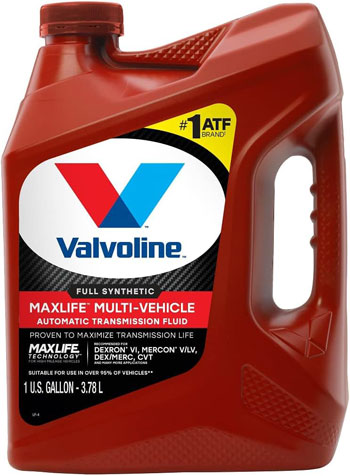
|
★ OUR #1 PICK! ★ Valvoline Multi-Vehicle (ATF) Full Synthetic |
|
|
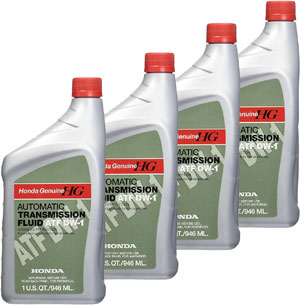
|
Honda FBA_08200-9008 08200-9008 Automatic Transmission Fluid |
|
|
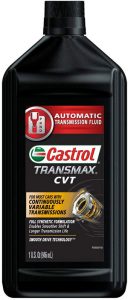
|
Castrol – 15B652-6PK Transmax ATF Black CVT Transmission Fluid |
|
|
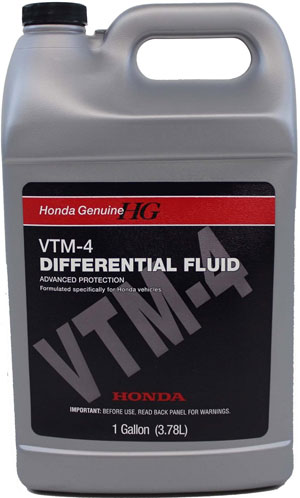
|
Genuine Honda Fluid 08200-9003 VTM-4 Differential Fluid |
|
|
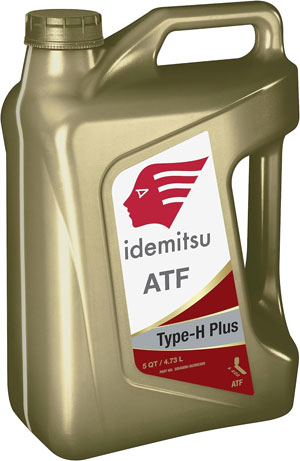
|
Idemitsu ATF Type H-Plus Automatic Transmission Fluid for Honda |
|
Reviews of Best Honda Transmission Fluid
Valvoline Multi-Vehicle (ATF) Full Synthetic Automatic Transmission Fluid
“Valvoline MaxLife Multi-Vehicle ATF” is a full-synthetic mixture with special additives to assist prevent transmission breakdown. And it even extends the transmission lifespan.

Here, it’s made to help avoid leaks, improve transmission performance, and even decrease transmission wear. And, it’ll even keep shifting smoother for longer than traditional fluids.
It’s made with a special blend of base oils & advanced additives to improve oil flow at low temperatures. It does that while also increasing film preservation at higher temperatures.
Different Formulation
To meet the challenging demands of automatic transmissions, the Tranny fluid is formulated with full-synthetic base stocks and advanced additive technology.
Compatibility Factors
It may be used in a wide range of ATF applications, including Ford, Toyota, GM, Honda, Hyundai, Nissan, BMW, Volvo, Mercedes, VW, and Audi vehicles.
Different Recommendation
The following apps are suggested for use: “GM DEXRON-II”, “DEXRON-III”, “DEXRON-VI”, “Toyota or Lexus Type T”, “T-II”, “T-IV”, “WS”, and VW/Audi G-052-025-A2, G-052-162-A1. Valvoline Full Synthetic CVT Fluid is recommended for CVT applications.
Pros
- More manufacturers’ specifications are met or exceeded than any other product on this list.
- Allison TES 389 and C-4 certified Dexron VI, Mercon V, and Mercon LV compatible Works for most European automobiles including Audi, BMW, Mercedes-Benz, and Saab.
- The thermal characteristics of fully synthetic base oils are superior to those of traditional oils.
- Certified to JASO-1A.
Cons
- CVT transmissions (CVT) and dual-clutch gearboxes are not recommended.
- ATF+4 incompatibility.
Honda FBA_08200-9008 08200-9008 Automatic Transmission Fluid
This model (Honda FBA_08200-9008) replaces the ATF-Z1 and may be mixed with the Z1. It also applies to Honda automobiles. Nevertheless, you must’ve been cautious when applying it to avoid adding extra particulates to your Honda gearbox unintentionally.

Here, the ATF-DW-1 combines with the goods in your transmission to create an ideal balance of lubrication and friction, ensuring long service and adequate transmission.
Packaging
Pack of 4 Honda DW-1 Transmission Fluid, 1 quart. 7.58-pound package weight
Sufficient Protection
The Trans fluid viscosity range ensures excellent protection.
Other Features
Every pair of changes to the oil will maintain the fluid flowing smoothly. However, draining and filling does not eliminate the ATF-DW-1, it’ll always replace the old with the new if done regularly.
Pros
- Complies with Honda’s performance standards.
- At high and low elevations, the transition is smoother.
- Unique components are shielded from screens and “O” rings.
Cons
- It is not cost-effective.
- Because it needs regular refills during short periods of time, it is not recommended for lengthy service.
Castrol – 15B652-6PK Transmax ATF Black CVT Transmission Fluid
Castrol’s Transmax complete synthetic ATF is made with a Group III base oil, although the majority of its Transmax transmission fluids are made with mineral oil.

Here, the Castrol Transmax is a less expensive alternative to more expensive synthetics, yet it performs as well as Honda compatible transmission fluid.
Versatility
For practically every application, there is indeed a Transmax ATF. For example, Transmax Import Multi-Vehicle is acceptable for most Japanese automobiles. But it also fulfills ATF+3, Dexron III, and Mercon V specifications for American vehicles.
Here, the Transmax may require automobile owners to do a little more research, however, the savings may be well worth it.
Compatibility
Here, the fluid is compatible with- “MMC DIAQUEEN ATF SP-III, Mazda CVTF 3320, MMC DIAQUEEN CVT Fluid J1, Subaru I-CVT Fluid, MMC DIAQUEEN CVT Fluid J4, Subaru Lineartronic High Torque Chain CVTF, Subaru i-CVT FG, Toyota CVT Fluid FE, Toyota CVT Fluid TC”.
Pros
- There are formulations available that fulfill the majority of OEM specifications.
- It is far less expensive than the one-size-fits-all competitors.
- Thermal protection is provided via additive packages.
- Shifting is smoothed out.
- Extra seal conditioners are included in the high-mileage version to help rejuvenate these components.
Cons
- There isn’t a synthetic that serves as many cars as the competitors.
- The drain intervals for mineral oils are lower than those for synthetics.
Genuine Honda Fluid 08200-9003 VTM-4 Differential Fluid

Genuine Honda fluids are the original equipment manufacturer (OEM) fluids that came with your car. When you choose a genuine OEM fluid, you can trust the products and brand’s excellent quality and efficacy without trying to guess if the product will operate well with your car.
Here, it’s critical to protect your investment, and selecting the correct fluids may be difficult.
So don’t waste any more time looking for and purchasing something that could work. Choose a genuine OEM Honda fluid like Genuine Honda Fluid 08200-9003 VTM-4 if you want to stick with what you know.
Compatibility
All Honda models are compatible. Honda quality criteria are met. Specifically formulated for Honda cars.
Other Features
Resistant to thermal degradation at high temperatures Honda R&D collaborated on this project.
Pros
- All Honda models are compatible.
- Honda quality criteria are met.
- Specifically formulated for Honda automobiles.
- Resistant to thermal degradation at high temperatures.
- Honda R&D collaborated on this project.
Cons
- When you changed your differential oil, you’ll need to replace the crushed washers on the fill and drain plugs.
Idemitsu ATF Type H-Plus Automatic Transmission Fluid for Honda, Acura

Idemitsu ATF compositions are specifically tailored to satisfy the demands of Asian car transmissions. Each recipe has its own viscosity, friction durability, oxidation prevention, aeration control, and wearing protection characteristics.
Here, the material and information compatibility is crucial since an ATF affects every component in transmission. And, the Idemitsu guarantees that every Idemitsu ATF formula has been examined and certified for adequate material compatibility.
Different Formulation
Original equipment manufacturers’ friction materials and specific viscosity requirements are precisely matched, resulting in ‘dialed-in’ performance. It’s designed exclusively for Honda and Acura automobiles that require Honda ATF Z-1 / DW-1 fluid.
Optimum Performance
Anti-shudder durability, oxidation stability, and deposit management are all excellent for this Honda compatible transmission fluid. Higher torque capacity and smoother shifts for rising clutch engagements.
Pros
- Idemitsu ATF Type H-Plus is developed exclusively to be used in Honda & Acura engines where Honda ATF Z-1 / DW-1 fluid is specified.
- Fuel efficiency is improved.
- Longer fluid life is achieved by excellent resistance to oxidation
- Gears and bearings are well-protected.
- When compared to the original OEM fluid, this fluid has been specially engineered.
- Provides better clutch performance for modern and older automobiles.
Cons
- Only for Honda and Acura vehicles.
Genuine Honda Fluid 08200-9008 ATF-DW1 Automatic Transmission Fluid
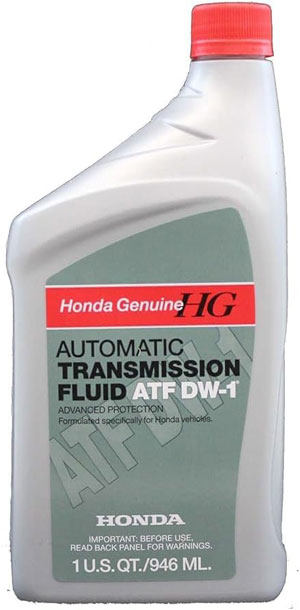
This genuine Honda transmission fluid fits the Honda Fit the best and is one of the most extensively used automatic transmission fluids in all Honda cars with automatic transmissions.
This is the manufacturer’s suggested option, thus it’s the best option. Here, the fluid is engineered to fulfill all Honda quality requirements and is designed to provide outstanding and smooth shifting in both cold and hot climates.
Another advantage of “Honda DW1 Transmission Fluid” is its ability to prevent leaks and deterioration of O-rings and seals.
Specifications & Quality
Genuine Honda fluids are the original equipment manufacturer (OEM) fluids that came with your car. When you choose a genuine OEM fluid, you may rely on the products and brand’s excellent quality and efficacy without stopping to think if the solution will operate well with your car.
It’s critical to protect your investment, and selecting the correct fluids may be difficult. So don’t waste any more time looking for and purchasing something that could work.
Pros
- Honda quality criteria are met.
- At high and low temperatures, shifting is more fluid.
- Special chemicals protect seals and O-rings.
- Longer transmission fluid replacement intervals with low oxidation rates.
Cons
- Not affordable much.
Honda – 08200-9008 DW-1 Automatic Transmission Fluid
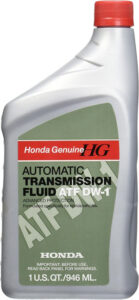
This Honda – 08200-9008 DW-1 transmission fluid type replaces the ATF-Z1 and may be mixed with the Z1. It also applies to Honda automobiles.
Nevertheless, you have to be cautious when applying it to avoid adding extra particulates to the Honda gearbox unintentionally.
The ATF-DW-1 combines with the goods in your transmission to create an ideal balance of lubrication and friction, ensuring long service and adequate transmission.
Efficient Oil Flow
Every pair of changes to the oil will maintain the fluid flowing smoothly. However a drain & fill does not completely eliminate the ATF-DW-1, it’ll always replace the old with the new if done on a regular basis.
Pros
- Complies with Honda’s performance standards.
- At high and low elevations, the transition is smoother.
- Unique components are shielded from screens and “O” rings.
Cons
- Only for Honda and Acura vehicles.
ACDelco GM Original Equipment 10-4014 Friction Modified Synchromesh Transmission Fluid
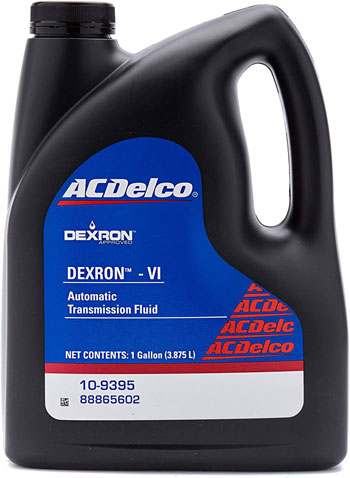
ACDelco is the genuine GM Original Equipment components brand, with over 90,000 GM Oem and other components infused with a century of knowledge, innovation, and quality.
To preserve, improve, and maintain your vehicle, ACDelco offers a complete line of lubricants, fluids, and vehicle maintenance products.
ACDelco provides all you need to maintain your GM or non-GM car looking and operating great, from adhesives, sealants, waxes, and cleansers to lubricants and paints.
Formulation
The synthetic fluid is specially formulated for synchromesh transmissions, allowing for better synchronizer performance. Sludge & varnish deposits are reduced, resulting in a cleaner transmission.
Protection
Surface distress is reduced by reducing spalling, corrosion, pitting, rust, and general wear.
Temperature as mild as -40 degree F (-40 degrees Celsius) to it as high as 300 ° Fahrenheit (149 degrees Celsius) are managed by this all-climate fluid. To decrease total transmission component wear, the friction is considerably changed.
Pros
- Every year, ACDelco components are found in over 2 million GM cars.
- Friction Modification is a synthetic mix of manual transmission fluid made for GM manual gearboxes.
- This fluid has exceptional lubricating qualities that help it last longer.
Cons
- Competitively priced but no lacking’s in quality.
6 Facts To Consider While Choosing The Best Transmission Fluid for Honda
Which automatic transmission fluid is the best? Which type of transmission fluid do I use? Should I purchase aftermarket or OEM products? What about a transmission fluid containing AutoZone?
What is the best place to get transmission fluid? What causes transmission fluid to dissolve?
These are the questions you might ask while picking a Honda auto transmission fluid.
Now that you’ve learned about all of your alternatives, the following step is to select the transmission fluid which will best serve you while also fulfilling all of your requirements.
However, making a pick is not always easy since you must consider factors such as your budget, vehicle compatibility, and other factors. It turns out that the greatest transmission fluid which your friend swears by isn’t doing you any benefits. And this isn’t an uncommon occurrence.
Often, what is best for somebody isn’t necessarily great for you. It differs from one situation to the next. Check the transmission fluid level before replacing or refilling the fluid.
However, you do not need to be perplexed because I’m here just to assist you. Here are some important factors to consider when selecting the best transmission fluid for your Honda vehicle.
Compatibility of Vehicles
Could you put some water in the fuel tank of a combustion engine? Isn’t that correct? But why is that? – Because it won’t work unless your engine runs on water (which would be revolutionary).
Here, the transmission fluids follow the same concept. Transmission failures might be deadly if you use the wrong transmission fluid that isn’t suitable for your car.
As a result, it is an important factor to consider when selecting the right Honda ATF fluid type. Some transmission fluids are universally compatible, which means they may be used in a variety of vehicles.
This is especially important if you have many cars since selecting various fluids for each vehicle can be a difficult chore. As a result, if you have many cars, a transmission fluid that really can sustain all of them would be the ideal option.
If a transmission fluid promises to serve all of your cars, you should always double-check. Check the owner’s handbook for each of your vehicles to see if that special type of transmission fluid is supported by the system.
If you don’t really have it for whatever reason, you may still check it up online or on the website of your automobile manufacturer. To get the maximum performance from your vehicle’s gearbox, you need to determine which transmission fluid to use.
A transmission fluid that isn’t suitable for your vehicle will only make it less economical. As a result, it’s advisable to exercise caution while selecting the appropriate gearbox oil for the manual or automatic transmission.
Additives that Protect
Any transmission system’s arch-enemies are oxidation, foaming, and corrosion. They cause the transmission to shift harshly, damaging the components and resulting in deadly transmission failures.
As a result, selecting a transmission fluid with protection compounds is essential. Anti-oxidation formulas are included in the finest transmission fluids, and they strive to maintain oxidation stability.
Some additives can also minimize foaming, defend against corrosion, and reduce transmission noise, among other things. It is common for certain transmission fluid to stay in your vehicle’s transmission after it has been used for a long period.
Here, it may even alter the fluid’s lubricating qualities, such as viscosity, which might cause transmission difficulties in the long run.
Transmission Oil: Synthetic vs. Conventional?
If you’ve read through our top reviews, you’ve probably seen that there are two sorts of transmission fluids: conventional and synthetic.
Synthetic ones use cutting-edge technology and outperform traditional ones by a wide margin. The top synthetic automatic transmission fluids can endure far greater temperatures.
This allows them to offer consistent performance even in the toughest situations. They are more difficult to break down and remain in the systems for a longer period of time.
However, with benefits such as these, vehicles are also rather costly. The conventional ones, on the other hand, just do the job. They’re less expensive, get a lower heat tolerance, and degrade rapidly.
If your car is older, it’s best to stick with the conventional ones because inert ingredients may not work with older automobiles.
In a nutshell, if you do have money and a vehicle that isn’t an older model, synthetic transmission fluid is the way to go.
Brand
Another important element to consider while shopping for new transmission fluids is the brand. The well-known brand is known for producing superior transmission fluids to those available on the market. A reputable brand must be your priority, especially if you’re looking for OEM fluids.
Your Budget vs. Price
You may not be able to afford all transmission fluid costs especially when you see genuine Honda transmission fluid price is high. That isn’t to say that the ones below the inexpensive margin aren’t valuable. In truth, there are a variety of low-cost solutions that can deliver excellent results.
As a result, if you’re working with a tight budget, you’ve chosen the greatest alternative that fits inside that range, and there are plenty of others.
If you’re in desperate need of transmission fluid, don’t put it off since you risk harming your system. Make the most of your resources.
Your Location
When shopping for Honda transmission fluid online, you may discover that the distributors do not deliver to your area. It’s also possible that you won’t be able to find it in your local shop.
If this is the case, you must choose the greatest option accessible in your area, whether offline or online, especially if you like to buy your items from local retailers.
Another critical consideration is the geographical state of your area or region since not all transmission fluids will perform well in your environment.
Many fluids degrade in extreme heat, whereas others malfunction in extreme cold. If you reside in such a climate, consider a fluid that performs well in all types of weather.
What Types of Transmission Fluid Do You Need for Honda?
We’re all accustomed to the regularity with which oil changes are performed as part of routine car maintenance. We do our duty (or not, if you’re anything like us) every 3,000-6,000 miles (or if the light comes on if you’re anything like us).
Here, the rest assured I’ve done the part to keep your car in good working order, whether you end up at the dealer with OEM oil or the local quick-lube joint with whatever’s on sale.
However, things might be rather weird when it comes to transmission fluid as well as other non-engine oil fluids. For starters, the cadence is much sluggish than each 3,000-6,000 miles.
So, Honda recommends emptying your transmission fluid just once per 100,000 miles, although many independent service centers may recommend flushing the fluid anywhere between 24,000 and 50,000 miles.
While Honda does not advocate flushing your automatic transmission fluid due to the risk of damaging the solenoids from the flush pump’s pressure, they do recommend using genuine Honda OEM automatic transmission fluid.
How to Change Honda Transmission Fluid?
Learning how to refill automatic transmission fluid can only help you in the long run if you can muster some early patience. You’ll need an automatic transmission filtration kit, which usually includes a pan gasket as well as the replacement transmission filter and it’s O-ring.
You’ll need some simple shop tools to get started, as well.
Because transmission fluid drains more efficiently at operating temperatures, let your vehicle idle for a few minutes before starting. Raise & secure the car after shutting off the ignition. Then, behind a 2 catch pan, lay down a sheet, some board, or newspaper. Next, unscrew the bolts on one end of the gearbox pan, taking care not to damage any hot exhaust components or fluid.
Next, loosen the remaining bolts one at a time, allowing the pan to gently tilt and drain. Raise the pan and discharge the leftover fluid into the catch pan once all bolts have been removed. If required, use a screwdriver to gently breach the gasket seal.
After this, clean the both pan as well as the transmission housing gasket surfaces. Clean the pan with solvent after inspecting it for metal particles or other evidence of interior damage.
Then, discard the previous transmission filter as well as the O-ring. Put the drain pan behind the filter since it contains liquid. Next, replace the transmission filter, ensuring that the O-ring is seated in the correct orifice.
After you’re done, using oil-soluble grease rather than gasket sealant or adhesive, adhere new gaskets to the pan.
Here, use threads sealer on some or all of the transmission pan bolts as directed in the repair manual, then screws in all fasteners finger-tight.
Starting in the middle, torque both pan screws to specification in a spiral pattern. The typical maximum torque is around 12 lbs. per foot.
Next, lower the car and add the proper amount of fluid to the transmission.
Here, drive the engine, let it warm up for a few minutes, then turn that off and inspect for leaks. If no leaks are detected, warm the car up on the level ground, shift through all gears, restore to park, and recheck the fluid dipstick while the engine idles.
FAQs
Honda uses what kind of transmission fluid?
Honda ATF-Z1 should always be used (automatic transmission fluid). If DEXRON III automatic transmission fluid isn’t available, you can use it as a stand-in. continued usage, on the other hand, may have an impact on the quality of the shift. As soon as possible, have the gearbox cleaned and replaced with Honda ATF-Z1.
Is it necessary to change the Honda transmission fluid on a regular basis?
Yes, Under “severe” circumstances, Honda advises changing the transmission fluid every 37,500 miles, and every 120,000 miles under “regular” conditions.
How often should a Honda’s oil be changed?
Oil changes are one of the most important and required services for your vehicle. Synthetic oil should be changed every 7,500 to 10,000 miles on average. For traditional oil, Honda advises changing your Honda oil and filter every 3,000-5,000 miles.
Who Makes Honda Transmission Fluid?
Honda’s transmission fluid is made by Honda at Its factories in Japan. Honda has a global network of suppliers that provide the raw materials and components used in its products.
Final Words
The best transmission fluid for Honda can be used in a wide range of automobiles, which says as much about the level of current transmission engineering as it does about modern chemical engineering. The disciplines have become so homogenized as a result of these high-tech undertakings.
Choosing an ATF for a car is a difficult undertaking, to say the least. The hefty expense of maintenance makes the choice seem important, which is why a respected, high-quality product such as Valvoline Multi-Vehicle (ATF) Full Synthetic Automatic Transmission Fluid appeals to so many people. It meets several OEM friction criteria with a lengthy synthetic base stock, and its use can increase a transmission’s useable life.




